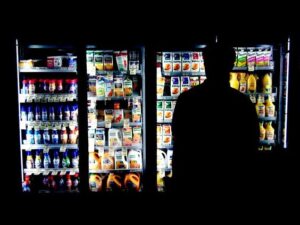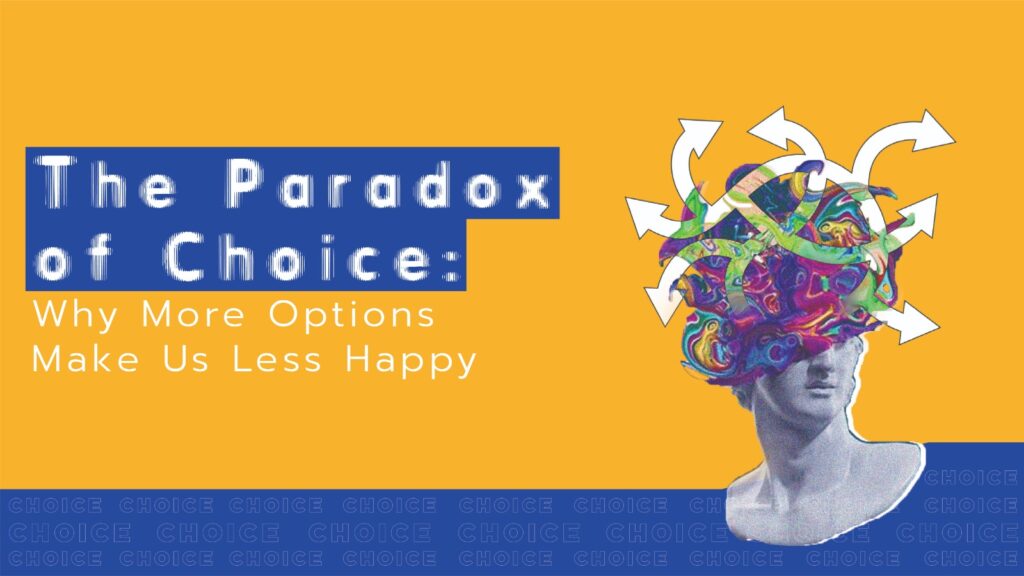Choices are like Russian dolls. Every choice is a gateway to another choice, and each choice in itself is a whole universe. Choices beget choices, and every option in a choice is a task- accept or reject, asks every option. Each option demands from us time, attention, and cognitive processing. So in a world full of choices, where the philosophy of “more is better” reigns supreme, choices can ultimately become counterproductive. The sheer amount can lead us into a tizzy, and then some, causing a decision paralysis.
Even for buying trash cans there are just so many options! There’s one for outside, one for inside, one for organic waste, another for inorganic, for dry waste, or wet waste. Then there’s the size, and the material. Do you want one that opens when you step on it? Maybe you want one that compresses all the garbage, or one that composts the garbage. WHICH IS THE BEST?
Understandably, this can be frustrating and overwhelming. But choices are rightfully associated with freedom. And as always, a good balance serves us best. So, let’s explore the psychology of choices and how to manage them effectively.
Choice Paradox

Choice is associated with freedom and free will. More options, then, should equate to more freedom and ultimately, more happiness. However, in reality it often leads to more stress and anxiety.
As psychologist Barry Schwartz explains this phenomenon in his book, “The Paradox of Choice”, more isn’t always merrier, and after a certain point, it isn’t even helpful. In fact, processing the sheer number of choices modern life presents can be an entire battle.
Imagine rowing a boat. The first few minutes are fun and invigorating, but by the end of the hour, we’d give anything for a rest. Similarly, making choices is effortful for our brains. By the end of the day, we just want to switch off. And understandably so!
Each option chosen is a choice against every other one. And, too many options make the process more tiring. Too many options similarly make the choosing process more effortful. Before a choice may come the anxiety of choosing incorrectly, and the fear of facing its consequences. After choosing a creeping sense of doubt, regret, and FOMO may follow.
Research and the Paradox
Research shows that choice can increase motivation, satisfaction, and well-being. Choice isn’t all bad, so is this counter-evidence to the paradox of choice? Schwartz argues that anything in excess becomes counterproductive.
Other research confirms this, showing that choice can overwhelm consumers, reducing motivation, amplifying regret, and undermining happiness. An abundance of options can lead to decision paralysis and ultimately, less satisfaction. In one study, researchers offered grocery store visitors a taste test of either 6 jams or a decadent 24 flavours. Interestingly, customers who sampled just 6 jams were 10 times more likely to buy jam afterwards (30% vs. 3%).

The technological boom that bestows choice on us also bestows the responsibility of choice. We see this everywhere, in food apps, OTT platforms, dating apps, shopping apps, etc.
Which product to buy?!– the modern notion of making the “perfect choice” to maximise benefit further complicates decision making and may leave us paralyzed in the face of overwhelming options.
The Smart Choice
So, are we doomed to decision overload and paralysis? Not quite! It’s natural to feel overwhelmed by choices. However, we can learn to manage them effectively, both in the decision-making process and in living happily (or at least contentedly!) with our choices.
- Option Decimation: Limits don’t restrict us, they underline our freedoms. They empower us. Start by narrowing your options early on using a relevant criterion. This will save you from decision fatigue and allow you to focus better on the remaining choices.
- Need/Want Analysis: Take a moment to analyse what’s essential for the decision and what you’re comfortable letting go of. What do you need, and what do you want? Knowing your desires helps you navigate the sea of options. This doesn’t mean restricting yourself solely to needs, but having an idea of your wants prevents you from being swept away by the flood of choices.
- Abandon the Elusive “Perfect” Choice: Striving for perfect choices with maximum benefit is an impossible dream. Prioritise your decisions. Not all choices hold equal weight! Often, a “good enough” decision is energy-saving and adequately helpful.
- Big decisions, small steps: Daunting major decisions can be tackled by breaking them down into smaller, more manageable steps. One firm step at a time!
- Befriend Regret: Regret is human. No matter what choice you make, even the seemingly best one, you might wonder if there was a better option. This feeling pushes us to do better, but it can also diminish joy. Acknowledge regret, learn from it, and use it to make better choices in the future. Finally, accept regret as part of the process. After all, hindsight is always 20/20, and we’re only human!
- Trust Your Gut: Sometimes, after all the research, our intuition leans towards a particular choice. Trust your gut feeling; it probably has a very good reason.
- Break Indecision: Sometimes, indecision can paralyse us. Set time limits to push yourself out of analysis paralysis and into action!
How you deal with choices is also a choice! And like every choice, you can improve it over time, and with practice. You have the power to choose better. Making a choice is a skill laced with multiple emotions that can often be deep rooted in past experiences, traumas, and cognitive biases. This is one of the reasons why therapeutic interventions (URL for book now) also help with effective decision making. You can always know more about how this can be helpful in an intake call with one of our therapists. Click here to sign up (intake form hyperlink). And if you ever need support in that process, we’re always just a call away!
References
- https://thedecisionlab.com/reference-guide/economics/the-paradox-of-choice
- https://journals.sagepub.com/doi/epub/10.1177/0256090917732442
- https://sci-hub.se/10.1016/j.paid.2019.02.004
- https://www.taosinstitute.net/files/Content/5693976/Scott_International_Journal_of_Self-Directed_Learning_2006.pdf#page=30
- https://medium.com/age-of-awareness/the-paradox-of-choice-and-how-to-beat-it-ee976cfd9940
- https://doi.org/10.1017/cbo9780511618031.017


